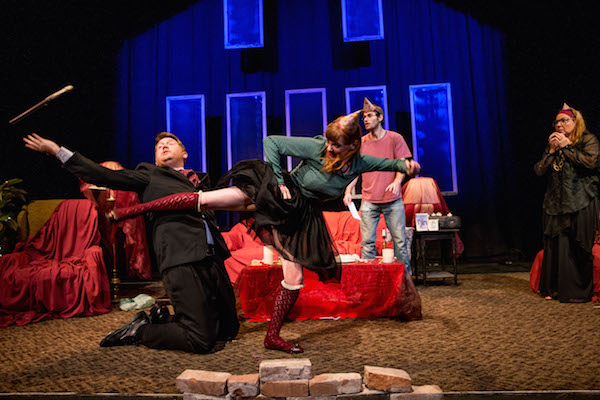
Any description of Sucker, the first offering of the Highland Arts Theatre’s fall 2016 season, will necessarily sound darker than it reveals itself onstage.
Jamie returns home from an impromptu and life changing trip to Israel determined to convert to Judaism and train to become a rabbi only to have his sister Beth upstage his news with her announcement that she has decided she’s a vampire. Their parents have recently died in a mishap (that can only be described as absurd and appalling) that traumatized their entire town. Constance, the slightly befuddled owner of the now destroyed “Odds and Ends” shop, is, to Jamie’s horror, renting their parents’ bedroom. Constance is guilt-ridden about her abusive husband’s death and how that guilt drove her son away from her.
Add into this mix a wannabe vampire “thrall” attempts not to boring and a socially maladroit lawyer’s verbal face-plants as he tries to convince bereaved survivors to find a silver ling in their tragedies and playwright Kat Sandler’s script offers plenty of dark moments of loss and pain.
Given that Sandler’s first play at HAT was Punch Up, a foul-mouthed absurdist romantic comedy [read Ken’s review here], and the director of this production, Ron Jenkins, first work on the HAT stage was Extinction Song about a child’s view of his father’s alcoholism, regular HAT audiences might have expected a very dark evening of theatre indeed.
But Sucker has a sweet heart pumping full of juicy laughs yet unafraid to open a vein of real grief and genuine emotion. It helps that even with dealing honestly with big themes (life, death, the existence of god), the play is constantly and often surprisingly hilarious.
Director Jenkins never overplays the absurdity and guides each syllable of dialogue and gesture from his cast to a real human emotion: for its subject matter, the play never feels contrived or over the top like a straight up stage farce. He knows when add a lighting effect to underscore the stage action without overpowering his actors’ performances. The play, for all its humour, has some provocative scenes including an intergenerational romance, an aside on the violence caused by fear, and a sad/funny moment involving the proper dietary uses of a pet rabbit. Jenkins with his cast made them real as watching a sunset. He also effectively uses Bradley Murphy’s set and costume designs (like the wall of blackened blue lit windows behind the set) to add to the off center humour of Sandler’s script to create a believable little life world.
Tayvis Fiddis and Hilary Scott, as Jamie and Beth, had great brother and sister chemistry that lent a naturalness to the expository opening passages. Besides giving well timed verbal twists to their barbed dialogue, Scott and Fiddis gave great comedic physical performances whether it was Scott’s manifesting Beth’s reluctance and revulsion during her attempts to finally sip some actual blood or Jamie’s embarrassment at being caught by Constance wearing only a sleeping bag that refused to stay decently in place. Both also effortlessly capture the immense ocean of grief at the death of their characters’ parents (made even more poignant by Sandler’s script by having them seem to be the lovably wacky Mom and Dad from a George S. Kaufman play).
Nancy Orkish has a charming off-handed way as Constance, a woman who decided face to life’s catastrophes in a way that would make Blanche DuBois look like Oscar the Grouch. But as her cheery façade revealed layers of pain and suffering, Orkish’s Constance transitioned believably from one way of coping with loss to a better more affirmative state. Andy Gouthro, whose character “Aenthe” (you’ll have to see the play to get a proper pronunciation lesson), had a late first act entrance but quickly and believably became part of the “family”. Whether in preposterously high-soled Goth boots of in black skeleton “footie” pajamas, Gouthro worked laughs from every intonation of his delivery and moment of physical comedy (like being chased around the apartment at various moments)
Mark Delaney as the mysterious Mr. Carter had the good fortune of delivering the majority of the “F-bombs” (if you are interested that kind of thing) and he used it to great comedic effect. Mr. Carter’s mission is revealed indirectly by Sandler in small scenes isolated from the action of the play, and in Delaney’s expert hands he becomes a sad but appalling figure. I felt a genuine dread for his inevitable entrance of the quartets’ heroic efforts to give solace to each other.
Sucker, for all its many laughs and constant absurdity, has in its writing, direction, and performance unexpected emotional and philosophical depth: bad things happen and we all die and we all survive and how do we find a way of continuing on that isn’t as vain and frivolous and horrific as the events that engulf us?
This production does an exemplary job on all levels of valiantly trying to answer those questions.
Sucker plays nightly at 8 pm until Sunday, October 23, at the Highland Arts Theatre on Sydney’s Bentinck Street.

